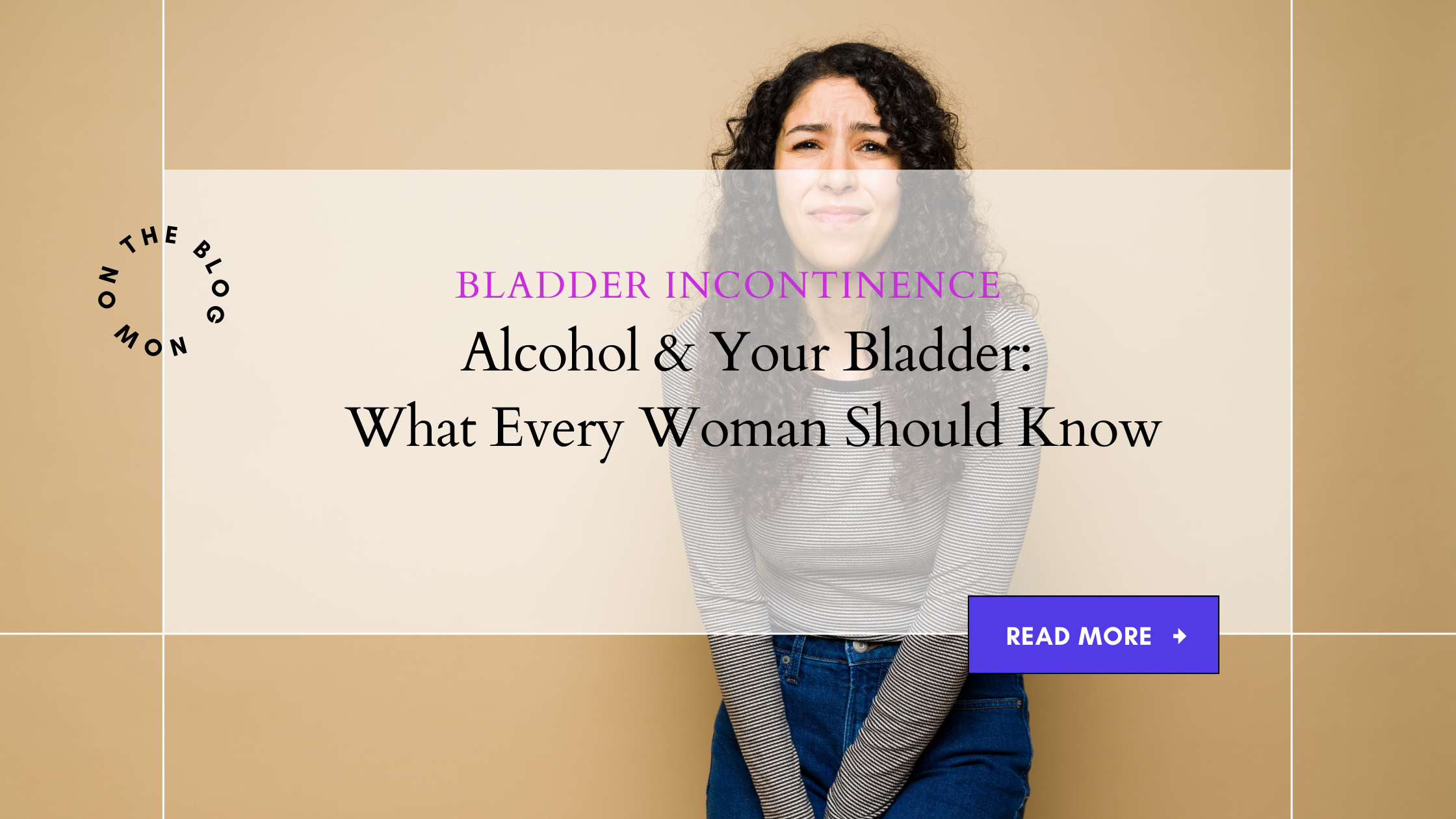If you’ve ever noticed your bladder acting up after a glass of wine or a night out, you’re not imagining it. Whether it’s more frequent bathroom trips, sudden urgency, leaks when you laugh, or even waking up to damp sheets (yes, it happens to more women than you think), alcohol can play a big role in bladder health.
The good news? Once you understand the connection between alcohol and urinary incontinence, you can make smart, simple changes that help you feel more in control — without necessarily giving up everything you enjoy.
In this guide, we’ll break down:
- How alcohol affects your bladder and pelvic floor
- Why some women are more sensitive than others
- What types of alcohol may cause more trouble
- Other bladder irritants to keep in mind
- Practical steps to reduce leaks and support bladder health
- Where to find more resources and personalized support
Understanding Urinary Incontinence
Urinary incontinence (UI) is when you accidentally leak urine. It’s common — over 35 million American adults live with some form of incontinence — but common doesn’t mean “normal” or something you just have to accept.
There are different types:
- Stress Urinary Incontinence (SUI): Leaks happen when you cough, laugh, sneeze, or exercise — anything that puts extra pressure on your bladder.
- Urgency Urinary Incontinence (UUI): That sudden, strong urge to pee… and sometimes you can’t make it in time. Often linked to overactive bladder.
- Overflow Incontinence: Your bladder doesn’t empty fully, so it overfills and leaks.
- Mixed Incontinence: A combo of two or more types, most often stress + urgency.
UI can be short-term (e.g., after a UTI) or long-term, with causes ranging from pregnancy and childbirth to menopause, pelvic floor weakness, nerve damage, and certain chronic conditions.
The Alcohol–Incontinence Connection
Alcohol Is a Diuretic
Alcohol signals your kidneys to produce more urine — which means your bladder fills faster and you have to go more often. If you already have pelvic floor weakness or bladder control issues, that extra volume can overwhelm your system.
It Irritates the Bladder
Alcohol can inflame the lining of your bladder, making it more sensitive. This can increase urgency and frequency, especially if you already have overactive bladder or interstitial cystitis.
It Suppresses Your “Hold It” Hormone
Your body makes an antidiuretic hormone (ADH) to help regulate urine production — especially at night. Alcohol suppresses ADH, so your bladder keeps filling instead of slowing down, which is why nighttime drinking can trigger middle-of-the-night bathroom runs… or bedwetting.
It Dulls Bladder Signals
Alcohol can interfere with the nerve signals between your bladder and brain, meaning you might not get the “time to go” message until it’s too late.
Does Alcohol Cause Incontinence?
Here’s what the research says: alcohol doesn’t directly cause urinary incontinence in most people. One study found only a slight difference in alcohol consumption between women with incontinence and those without.
But — and it’s a big “but” — if you already have bladder control issues, alcohol can make them worse by:
- Increasing the amount of urine your body makes
- Irritating bladder tissues
- Making it harder for your pelvic floor muscles to hold urine in
In other words, alcohol may not start the fire, but it can pour gasoline on it.
What Types of Alcohol Are Hardest on the Bladder?
All alcohol can have diuretic effects, but some drinks bring extra bladder irritants to the party:
- Beer: Carbonation + hops can irritate the bladder and increase urine output.
- Wine: Acidity and tannins can aggravate bladder lining.
- Spirits: Higher alcohol content = stronger diuretic effect; mixers with citrus or artificial sweeteners can make it worse.
- Cocktails: Carbonation, sugar syrups, artificial sweeteners, and acidic juices are a quadruple hit.
If you’ve noticed certain drinks cause more trouble, it’s worth doing a mini “bladder elimination” experiment — cut them out for a week or two and track changes.
Alcohol + Nighttime Leaks
Nighttime leaks (or bedwetting) aren’t just a kids’ issue. Up to 5 million American adults deal with it — and alcohol can be a major trigger.
Why?
- Most people drink socially in the evening, which means your bladder is already working overtime when you go to bed.
- Alcohol suppresses ADH, so your kidneys keep pumping out urine all night.
- If you’re in a deep sleep, dulled signals mean you might not wake up in time.
The fix: stop alcohol (and other fluids) 3–4 hours before bed, and go to the bathroom right before you sleep.
Other Common Bladder Irritants
If you’re cutting back on alcohol but still having leaks or urgency, other foods and drinks could be the culprit:
- Caffeine (coffee, tea, energy drinks)
- Chocolate
- Soda and other carbonated drinks
- Spicy, citrus, or acidic foods
- Artificial sweeteners
- Cranberry juice (yep — despite its UTI reputation)
- Sugary drinks and snacks
You don’t have to cut everything at once — try eliminating one at a time and tracking symptoms.
Lifestyle & Nutrition Strategies for Better Bladder Health
Bladder health isn’t just about avoiding triggers — it’s also about supporting your pelvic floor and urinary system from the inside out.
1. Strengthen Your Pelvic Floor
Targeted exercises like Kegels can help prevent or reduce leaks by strengthening the muscles that support your bladder and urethra. If you’re unsure you’re doing them correctly, a pelvic floor physical therapist can help.
2. Stay Hydrated (Smartly)
Cutting fluids too much can actually make things worse by concentrating your urine and irritating your bladder. Aim for steady hydration during the day, and taper off in the evening.
3. Supportive Nutrition
A balanced diet with anti-inflammatory foods can support bladder tissue health and overall pelvic function. Focus on:
- Leafy greens, colorful veggies, and berries
- Lean proteins and healthy fats
- Whole grains for steady energy and digestion
4. Manage Weight & Movement
Extra body weight can put more pressure on your bladder and pelvic floor. Gentle core and pelvic-friendly workouts can help — no high-impact moves needed.
5. Mind Your Gut Health
A healthy gut supports a healthy bladder. Constipation can worsen leaks, so fiber and hydration are key.
The Bottom Line
Alcohol may not be the root cause of urinary incontinence, but for many women, it’s a potent trigger. Understanding how it interacts with your bladder — and knowing your personal tolerance — can help you enjoy your life while staying dry and confident.
You don’t have to give up everything you love. Small shifts in what and when you drink, plus a focus on nutrition and pelvic floor support, can make a big difference.
👉 Ready to learn which foods and habits support a happier bladder?
Visit our Nutrition & Wellness section for practical tips, recipes, and expert insights that help you take control of leaks — without giving up your social life.


